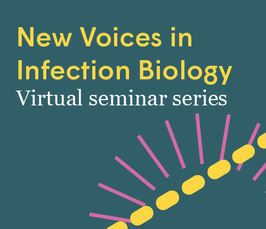Investigating the mechanisms underlying aged host-virus interactions in Drosophila | New Voices in Infection Biology
- Date: Sep 9, 2020
- Time: 04:00 PM (Local Time Germany)
- Speaker: Stanislava Chtarbanova
- University of Alabama, USA
- Location: Zoom video conference
- Host: Igor Iatsenko
- Contact: vseminars@mpiib-berlin.mpg.de

If you are interested in joining the seminar, please contact: vseminars@mpiib-berlin.mpg.de
Once registered, you will receive a zoom conference link 30 mins before the talk starts - please sign in using your full name.
Talk abstract:
Viral infections represent an important burden among the elderly and are often associated with higher incidence, severity and mortality rates. Additionally, the aged organism itself represents a favorable environment for the accumulation of mutations in viral genomes that could possibly result in the emergency of novel pathogenic strains of significant public health concern. A better understanding of the interactions between viruses and their aged hosts could uncover novel mechanisms that underlie the capability of the organism to survive infection and limit pathogen spread. The common fruit fly Drosophila melanogaster has been widely used as a genetically tractable model for studies of both innate immunity and aging, uncovering evolutionarily conserved mechanisms that govern these processes. Despite the numerous advantages that this organism offers, studies of aged host-virus interactions are only starting to emerge. In the upcoming seminar, I will discuss the efforts employed in our lab to model these interactions using aged Drosophila as the host, and the RNA-containing Flock House virus (FHV) as the pathogen. We show that in comparison to younger flies, aged Drosophila succumb more rapidly to FHV infection likely due to an age-dependent defect in resilience. Utilizing genetic and transcriptomic approaches, we also find that survival to FHV infection of the aged organism is a continuous trait and that the transcriptional response to infection of aged flies is more robust than the response of younger animals. We also demonstrate that FHV pathogenicity is affected after a passage in the aged host. We propose that Drosophila could serve as an excellent experimental system to unravel the fundamental mechanisms underlying the interactions of
viruses and their aged hosts and could have long term implications for improving the outcome of infections among the elderly and preventing pathogen emergence.